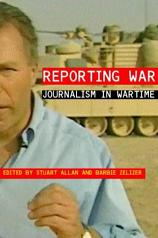
Reporting War
Stuart Allan & Barbie Zelizer (editors)
374 pages including index
published in 2004
Having kept a politically orientated weblog the past half decade or so I’ve become acutely aware of the limitations of journalism, particularly during wartime. The current war for South Ossetia provides a good example of these limitations, were we’re seeing live how difficult it is for journalists to even get to the combat zone, not to mention how dangerous, as the death of a Dutch camera man proved. Perhaps more worrying, as the conflict continued the reporting on it which started off fairly neutral has become more and more partisan, especially once the United States and the European Union got involved in its resolution, with Russia pictured as the agressor when in fact it was Georgia who started the war. Russian statements are treated with skepticism while quotes from approved official sources, like the Pentagon or NATO are quoted verbatim. In general the war is treated through an American or European lens, rarely from the point of view of the Russians or Georgians, let alone
the Ossetians…
All these problems are described in Reporting War, a collection of essays on the role of journalism in wartime, its difficulties and dillemas. Published a year after the American invasion of Iraq, a lot of attention is of course paid to the problems of that particular war. The book doesn’t just look at the role of the journalists themselves, but also how they are dealt with by armies and governments involved in war, with a specific focus on the US army’s management of journalist during the first and second Gulf War. What’s more, several essays look beyond the physical reality of reporting wars to the role the media plays in general in covering wars. Not every conflict is covered equally after all.